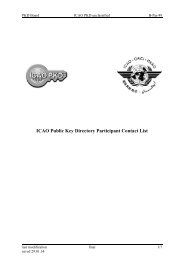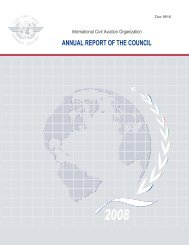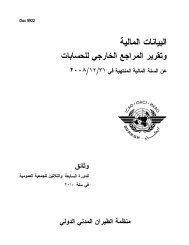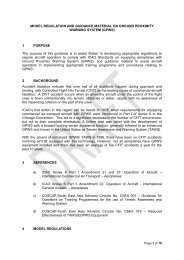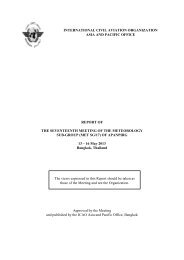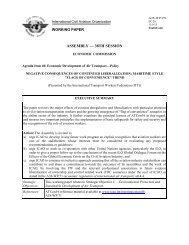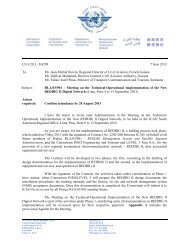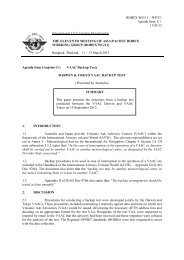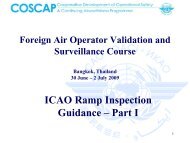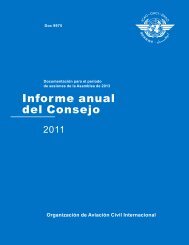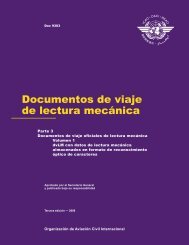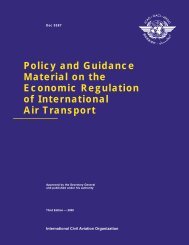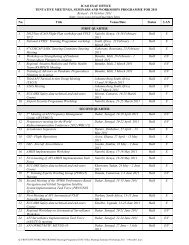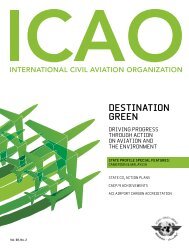Joint Western & Central African (WACAF) Office and - ICAO
Joint Western & Central African (WACAF) Office and - ICAO
Joint Western & Central African (WACAF) Office and - ICAO
You also want an ePaper? Increase the reach of your titles
YUMPU automatically turns print PDFs into web optimized ePapers that Google loves.
Participants to the First meeting of the PBN <strong>and</strong> GNSS Implementation<br />
Task Force (PBN/GNSS TF/1) held in Nairobi in October 2010.<br />
Challenges identified in the AFI region in particular in this<br />
regard include the following:<br />
a) Lack of procedure design training: initial, OJT, <strong>and</strong> or recurrent.<br />
b) High turnover among procedure designers.<br />
c) Insufficient procedure design work in some States to attain<br />
or maintain proficiency.<br />
d) Lack of depth in procedure design organization to perform<br />
quality assurance (QA).<br />
e) Insufficient expertise in procedure design organization to<br />
provide adequate QA of procedures.<br />
f) Lack of procedure design <strong>and</strong> obstacle data storage<br />
automation in the States.<br />
g) Insufficient regulatory expertise to oversee the procedure<br />
design service provider.<br />
In view of the above, the AFI region agreed to establish the<br />
AFI Flight Procedures Programme (FPP). The goal of the FPP<br />
would be to address some of the issues above <strong>and</strong> foster<br />
implementation of flight procedures, developed with the<br />
appropriate quality systems, especially PBN <strong>and</strong> vertically<br />
guided instrument approach procedures by:<br />
a) Assisting those States with sufficient procedure design requirements<br />
to establish a sustainable internal procedure design<br />
capability to meet the requirements of PANS OPS <strong>and</strong> their<br />
responsibility under Annex 15 for the quality of their procedures.<br />
b) Providing the appropriate level of technical expertise<br />
necessary to enable certain States, which do not have the<br />
density of procedures necessary to sustain an internal<br />
procedure design capability, to meet their responsibilities<br />
under Annex 15 <strong>and</strong> PANS-OPS.<br />
c) Providing a vehicle to improve quality in the States’<br />
procedure design process through access to procedure<br />
design automation solutions <strong>and</strong> associated data storage.<br />
The FPP is envisioned to be a not-for-profit centre of excellence<br />
in the field of flight procedures design. It would employ best<br />
practices in training, automation <strong>and</strong> quality assurance to<br />
address the procedure design needs of States. Options of<br />
services that may be offered by the FPP include the following:<br />
■■ Services such as procedures <strong>and</strong> training made<br />
available on a cost recovery basis.<br />
■■ Services provided on “free of charge” cost basis<br />
depending on contributing States’ (<strong>and</strong>/or donor)<br />
support of such arrangements.<br />
■■ Services provided on business principles in order<br />
to raise funds for the FPP.<br />
Acknowledging that the concept of the FPP was new,<br />
agreement was reached within the framework of APIRG<br />
that, in order to improve the opportunities for success,<br />
the AFI FPP should draw on the establishment <strong>and</strong> opera-<br />
tional experiences of the APAC FPP. Accordingly, establish-<br />
ment of the AFI FPP was put in abeyance.<br />
Following consultations <strong>and</strong> observation of developments<br />
relating to the APAC FPP, in February 2011 it was recognized<br />
that valuable experience had been gained in the establishment<br />
of the APAC FPP. Accordingly, a State Letter was issued to<br />
States providing air navigation services in the AFI region,<br />
inviting them to indicate interest in the hosting <strong>and</strong> support<br />
of the FPP, as well as to assess the expected level of usage<br />
of the FPP services, when established.<br />
It is expected that, based on the degree of support that will be<br />
extended by States <strong>and</strong> interested organizations, the AFI FPP<br />
could be established <strong>and</strong> operational by early 2012.<br />
ATS Route Development<br />
AFI AIR TRAFFIC MANAGEMENT<br />
In April 2010 the ATS/AIS/SAR Sub-Group established the<br />
PBN Route Network Development Task Force (PRND TF),<br />
charged primarily with the review of the AFI ATS route network,<br />
<strong>and</strong> development of fuel efficient ATS routes applying the<br />
PBN concept. By the end of 2010, with the support of the<br />
International Air Transport Association (IATA) <strong>and</strong> its member<br />
airlines, more than 60 fuel efficient ATS routes, most of<br />
which are regarded as critical or high priority for operators,<br />
were agreed within the purview of the PRND Task Force for<br />
implementation, either as new, extension, or modified<br />
existing routes.<br />
Success in this effort has provided stakeholders in the<br />
region with confidence in the ability of existing mechanism<br />
to advance the concept of an efficient ATS route network in the<br />
AFI region, which paves the way for a comprehensive review of<br />
the route network.<br />
The next task for the PRND Task Force will therefore be a<br />
comprehensive review of the AFI ATS route network <strong>and</strong> its<br />
optimization pursuant to regional performance objectives<br />
<strong>and</strong> the Regional PBN Implementation Plan.<br />
REGIONAL REpORt - AFRICA - 2011 33



